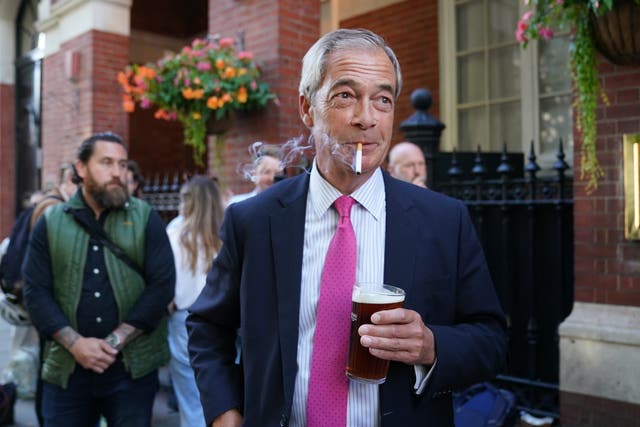
Reform UK leader Nigel Farage said the “spirit of Oliver Cromwell is alive and well” as MPs debated a ban on tobacco and vapes.
The MP for Clacton said he “likes a smoke” as he expressed his opposition to the Government’s Tobacco and Vapes Bill that would prohibit smoking outside schools, children’s playgrounds and hospitals.
The Bill also aims to create a smoke-free generation with anyone born after January 1 2009 to be prevented from legally smoking, by gradually raising the age at which tobacco can be bought.

During the Bill’s report stage, Mr Farage told the Commons: “I have to say, I find the tone of moral superiority in this chamber this afternoon almost unbearable.
“You clearly believe you are better human beings than those outside of here who choose to pursue activities that you perhaps would not.
“Well, it’s a bit of a shock, I suppose, to some of you, but there are some of us that like a smoke. We do. We even go for a few pints at a pub. We have a punt on the horses. I even attempted to have the odd doughnut, I know that’s really perhaps the naughtiest of all.
“Because we want to have fun. We want to make our own minds up. You can educate us. You can tell us. You can give us the facts. But the idea that this place should make those decisions for other people, well it sort of shows me that the spirit of Oliver Cromwell is alive and well.”

Mr Farage said he is described “the idea that from 2009 nobody could buy tobacco products, but those born in 2010 could” as “just another aspect to two-tier Britain”.
He said: “I’ve been hearing for decades that there’ll be a war on drugs. Where’s it getting us? Drug use is rocketing, Class A drugs in particular, proliferating everywhere, with all the associated crime.
“And here’s the danger. Here is the danger: an ounce of tobacco is now more expensive in a shop if purchased legally, believe it or not, than an ounce of silver. And so already we have a rocketing trade in illegal cigarettes and loose tobacco.”
He went on to say: “Do not drive tobacco into the hands of the criminals. Do not create a new black market.
“I totally agree with the minister. This is not an activity we should encourage. We’re not keen for our kids to do it, but please treat us as grown ups. Educate us. Let us make our choices. Don’t let the criminals win.”
Before his contribution, Mr Farage declared an interest as the co-founder of Action on World Health, an organisation dedicated “to reform or replace” the World Health Organisation (WHO).
Speaking after the Reform leader, Labour MP for Worthing West, Dr Beccy Cooper, said she welcomed the Bill “on behalf of public health consultants”.
She said: “The premise of public health is data and evidence and so opinions are interesting. Opinions can have great colour to a conversation. Opinions can have great characters, but data and evidence in public health will ultimately deliver better population health outcomes.
“And this public health bill is a public health bill that will stop people dying and will take away the addictive nature of a substance that is not a choice. Public health has been subject to conversations around, should we or shouldn’t we impose things for many years, this conversation is not new.”
Conservative MP for South Holland and The Deepings, Sir John Hayes, also objected to the Bill on the grounds it would lead to “a huge surge in illegal tobacco”.
He said: “In our post spiritual, or at least post religious age, two phenomena are evident when God is forgotten and faith declines. It’s not that people believe in nothing, as GK Chesterton said, they believe in anything, and they find new crusades. In the advocacy of this Bill I know they believe that, crusading in a noble cause.
“The second thing that occurs is as demons are regarded as purely mythical entities, things that were once regarded as normal, as regular, become demonised.
“And so the curious paradox is that whilst cocaine is widely available, and I am told de rigueur among certain elements of the urban liberal elite, smokers are now seen as heretics.
“And if this wasn’t so alarming, the subject of comic satire, that’s the kind of world we live in. We are simultaneously becoming more puerile and more puritanical.”


Comments: Our rules
We want our comments to be a lively and valuable part of our community - a place where readers can debate and engage with the most important local issues. The ability to comment on our stories is a privilege, not a right, however, and that privilege may be withdrawn if it is abused or misused.
Please report any comments that break our rules.
Read the rules hereLast Updated: 1st January 1970 12:00 am
Report this comment Cancel